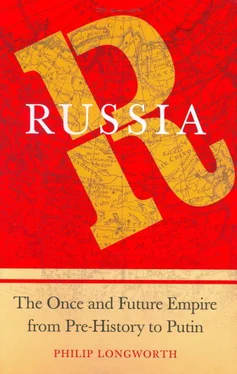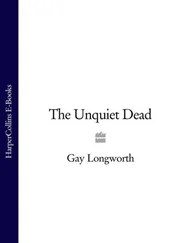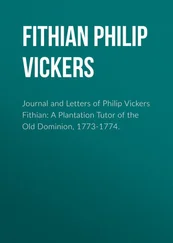The political coherence of Russia depended on the princes, especially on the grand prince of Vladimir-Moscow. By the fourteenth century the Tatars had relaxed their grip sufficiently to allow the princes to pursue policies that were rather less subservient. The first hint of change came when Ivan I was the leading Russian prince.
Historians customarily picture Ivan as cruel, sly and hypocritical, even though the chronicles yield virtually nothing about his character or personality except that his nickname (coined by an unappreciative brother) was Kalita — ‘Money-Bag’. This suggests that he was a good money manager, ungenerous, perhaps, and greedy. Inferences from actions, difficult though these sometimes are to reconstruct, 9suggest that he was also a canny strategist and a tough negotiator. His chief concern was unheroic: to maintain and, if possible, enlarge his heritage. He seized his opportunities, but only when it seemed safe to do so. Otherwise he prudently observed convention, kept the Church on his side, and never offended the Khan. The complexity and dangers of his predicament hardly allowed him to play the hero. Ivan is remembered as a significant historical figure in Russian history because he stumbled on opportunities. He happened to live at a juncture when he could exploit the Tatar khan’s dependence on his services and establish Moscow as the pre-eminent centre for the Russians.
A grandson of Alexander Nevskii, Ivan was born around 1288 and came to prominence in his forties, when he was enthroned as grand prince of Vladimir as well as prince of Moscow. Vladimir, to the east of Moscow, had been founded in 1108 on the river Kliazma, a tributary to the Volga. He reigned for only nine years. Yet one of his more significant achievements belonged to the period before he became grand prince. In 1325 he persuaded the Metropolitan of Kiev, Petr, to move permanently to Moscow. As an extra inducement he built the Cathedral of the Dormition, one of the four famous cathedral churches enclosed along with the palace within the walls of Moscow’s castle, the Kremlin. The expense was justified as well as affordable, for the new church added religious lustre to the place, and by extension to the Grand Prince. To have the head of the Russian Church based in his own city rather than Kiev was a great coup. It gave Moscow spiritual preeminence in Russia, and lent its prince particular prestige and clout.
Though their titles suggested authority, every Russian ruler of the time was a Tatar underling and had to accept regular humiliation. On the death of his predecessor a prince had to apply to the Khan at Sarai for permission to rule his inheritance. If his appointment was approved by the grant of a yarlyk, the Khan’s men would take the prince to his capital, enthrone him, and monitor his activities thereafter. Ivan took good care to please the Khan. When, therefore, Prince Dmitrii of Tver murdered his brother, Grand Duke Iurii, in a revenge killing in 1326, Ivan no doubt expected to be made grand prince. He was to be disappointed.
The Khan eventually executed Dmitrii for the murder, but then made Dmitrii’s brother, Aleksandr, grand prince. Aleksandr was evidently in the Khan’s good graces too. 10Ivan had no alternative but to acquiesce, and wait. Then, in 1327, an anti-Tatar uprising erupted in Tver. Many Tatars were lynched, and Ivan rushed off to Sarai with the news. Uzbek Khan responded by entrusting him with a Tatar army 50,000 strong, telling him to punish Tver. He also authorized him to rule the western districts of the grand principality. But he did not appoint him grand prince. Instead he chose Aleksandr of Suzdal, who ruled the eastern districts, including Vladimir. Aleksandr is said to have carried off the cathedral bell from Vladimir and reinstalled it in the cathedral of his own city, Suzdal, but, according to one (presumably pro-Muscovite) chronicler, it refused to ring there. 11This was a way of suggesting that Aleksandr’s appointment lacked divine sanction. However, after Aleksandr’s death, in 1331, Ivan was finally confirmed as grand prince of Vladimir ‘and All Russia’.
The Khan’s reluctance to appoint him earlier had not been based on favouritism or whim. Nor was his preference for the princes of Tver and Suzdal. The decision reflected a sober appreciation of the fact that the Principality of Moscow had come to command more resources than any other principality. It had become altogether too mighty. That was why the policy-makers at Sarai had promoted Tver, Moscow’s rival. But then Tver had rebelled. So another counter-weight to Moscow had to be found. This explains the division of Tver’s territories between Ivan and Aleksandr. By 1331, however, the Khan’s priorities had changed. A grand prince of Vladimir ‘and all Russia’ was needed now to guard the Khan’s western territories, which were threatened not only by Sweden, but also by the fast-rising Grand Duchy of Lithuania. Its ruler, Olgerd, had been expanding vigorously towards the south and west, vying with Moscow for control of Novgorod, and threatening Smolensk and Pskov. Suddenly Sarai saw a strong Moscow as an asset rather than a danger.
Ivan recognized his chance and seized it. Some years previously his brother the grand prince lurii had taken responsibility for the collection of tribute for the Tatars from all north-eastern Russia. Now the indispensable Ivan turned the Khan’s rising dependence on him to good account by having the baskaks removed and charging all the princes with collection under his supervision. 12In practice this made the Grand Prince governor of all the princes. Nevertheless, Ivan was far from confident that his patrimony would remain intact or that his descendants would inherit it. This much is evident from his several wills.
In one of them, made within a year of his death and witnessed by three priests, he declares himself to be ‘the sinful, poor slave of God’ and bequeaths his patrimony, Moscow, to his three sons. He proceeds to specify every property precisely, and in stating which towns and villages each son should have, he mentions that he has already given the eldest, Semen, ‘four golden chains, three golden belts… a golden plate set with a pearl and precious stones… my red fur coat with pearls and my gold cap’. Yet he is by no means certain that his wishes will be honoured, that the Tatars will not intervene. ‘If for my sins the Tatars should covet any of these… [properties] then you, my sons and my princess, should divide… [those that remain] among yourselves.’ Nor, anxious though he is that memory of him and of his ancestors should not be extinguished, is he confident that his work, his patrimony, will be perpetuated. 13Yet his tomb and those of his descendants in the Kremlin’s Cathedral of the Archangel still witness to the fact that it was.
The reign of Ivan ‘Money-Bag’ marks a watershed not only for Tatar rule in Russia, which was never again to be as firm and assured as it had been in the first quarter of the century, but for Moscow as the centre of Russian political life. By the end of the century the Grand Principality had come to be regarded as the patrimony of the princes of Moscow. This was the foundation on which the new Russia was to rise.
The metropolitans had played a vital role in developing Moscow’s political role, and none more so than Metropolitan Petr. The future saint’s hagiog-rapher assures us that Petr ‘foresaw the future glory of Moscow’ even ‘while it was yet poor’. Yet when Ivan pressed him to move there he seems to have implicitly insisted on a condition: ‘If thou wilt build a temple here worthy of the Mother of God,’ he told Ivan, ‘then thou shalt be more glorious than all the other princes, and thy posterity shall become great.’ 14The Cathedral of the Dormition was started, Petr duly arrived, and the continuing close co-operation between the grand princes and metropolitans of Moscow did much to ensure the fulfilment of Petr’s prophecy.
Читать дальше





![Stephan Orth - Behind Putin's Curtain - Friendships and Misadventures Inside Russia [aka Couchsurfing in Russia]](/books/415210/stephan-orth-behind-putin-s-curtain-friendships-a-thumb.webp)





